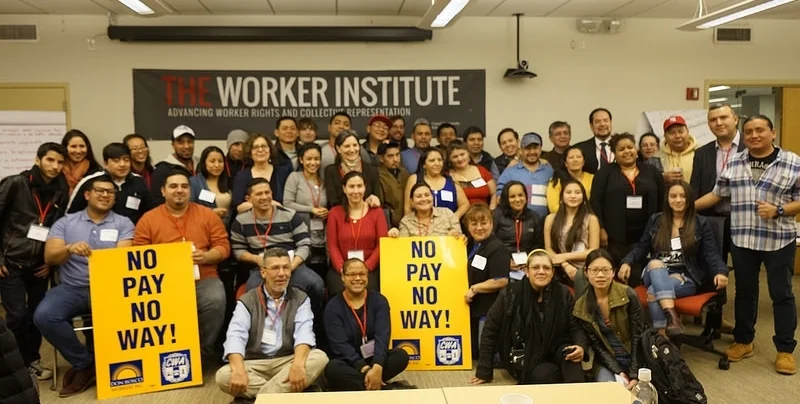Sol Aramendi is a New York based Argentinean artist working in new media, photography and video. She is the founder of the Project Luz photography program for New Immigrants and has developed twelve outreach programs at museums to engage Spanish-speaking immigrants with the arts in New York City.
Apps for Power is a project that develops a wage-theft app (now named Jornalero, which means day laborer in Spanish). The project was built on the collaborative process of day laborers, community organizers, artists, and computer programmers. According to its developers, "the project pushes the political potential of social networking technology, as it is also a creative attempt at holding ‘bad actors’ accountable for the harm they cause." Apps for Power provides a platform for day laborers to share information, identify harmful employers, and seek legal aid. The app is also viewed as "an integral part of grassroots mobilization and social justice practice," as well as tools for empowerment.
Zaijun Wu: Can you explain why you started the project?
Sol Aramendi: I have been running a program called Project Luz for 13 years. Project Luz invites immigrants from Hispanic countries to make connections between their everyday life experiences with learning as a tool of empowerment. Two years ago, one of the participant Hana Georg, also a local electrician said, “why don’t we create an application to help day laborers?” I found this was a really important social practice, and more importantly, it was a good way of community engagement. So together we proposed the idea to National Day Laborer Organizing Network (NDLON) in LA and at that time the organization was dealing with wage-theft. So the two ideas became one.
ZW: Did you have any experience before in app developing? What were the steps?
SA: No, I did not have any experience in app developing before Apps for Power. I learned by doing.
First of all, I want to point out that this is a collaboration with many professionals. I had ideas but it was something new for me and I could not do it by myself. I knew we needed a developer for code-writing, so someone recommended Alyx Baldwin. He was an activist and had experience in app developing. I talked to the union laborers about what they needed for the app. Then I talked with the developer. He also came a few times and worked on the wide frame. NDLON and Cornell University also helped us with research and information gathering. Significance Lab (now has changed its name to Blue Ridge Labs) in New York, an incubator for technology to improve the lives of low-income Americans did a study on low wage workers. I do not have a fixed team for this project, but I can always find the right person to turn to as the project grows. In the things that I don’t know, I ask an expert, or two or three experts. That’s how it works. We didn’t have a lot of budget until receiving our first funding in December last year. This is also why it takes so long (two years).
ZW: Do you have any recommendations for artists who either want to develop an app themselves or join an app developing project?
SA: Collaboration is important. This is a collaboration where everyone brings his or her own expertise. The developers didn’t have experience in working with the community while community engagement was my strength. I could keep the communication flow with the community but I could not write codes. There are experts. You have to first know your goals and then reach out to those experts. You also have to be very responsive and co-ordinate as a leader of the project. For example. I talked with lawyers, activists, laborers, organizations and organizers. You have to oversee the whole process and make sure the communication flows between different parties.
Learn through the process. I didn’t know much about day laborers. I also didn’t, and still don’t know how to write codes, but it doesn’t matter. For me, the most interesting part of the work was the engagement with the community through the process.
ZW: What's your next plan?
SA: I am working on the final manual. We will test the app and plan to launch it in May. It will be available both on IOS and Android devices.
Before the idea of Apps for Power, I had another program called Use Your Cell Phone. It was a workshop that aimed to increase immigrants’ mobile digital activism using free available tools. Now I am looking for funding to continue this program.

